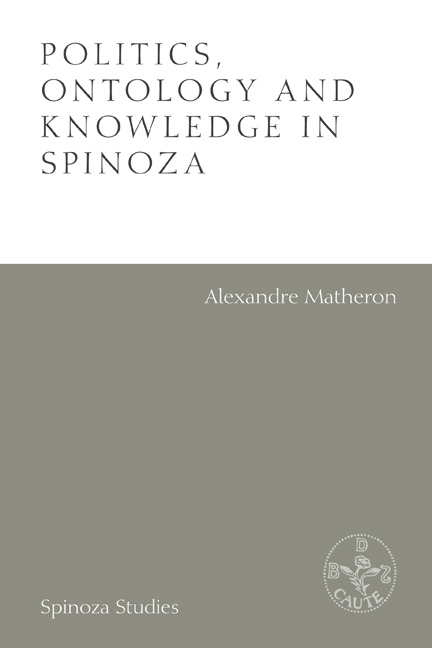Book contents
- Frontmatter
- Contents
- Abbreviations
- Notes on Translation and Acknowledgements
- A Revolutionary Beatitude: Alexandre Matheron’s Spinozism
- I Spinoza on Ontology and Knowledge
- 1 Idea, Idea of the Idea and Certainty in the Tractatus de Intellectus Emendatione and the Ethics
- 2 Essence, Existence and Power in Part I of the Ethics: The Foundations of Proposition 16
- 3 Physics and Ontology in Spinoza: The Enigmatic Response to Tschirnhaus
- 4 The Year 1663 and the Spinozist Identity of Being and Power: Hypothesis on a Development
- 5 Eternal Life and the Body According to Spinoza
- 6 Intellectual Love of God, Eternal Part of the amor erga Deum
- II Spinoza on Politics and Ethics
- 7 State and Morality According to Spinoza
- 8 Ethics and Politics in Spinoza (Remarks on the Role of Ethics IV, 37 Scholium 2)
- 9 Indignation and the Conatus of the Spinozist State
- 10 Passions and Institutions According to Spinoza
- 11 The Problem of Spinoza's Evolution: From the Theologico-Political Treatise to the Political Treatise
- 12 Is the State, According to Spinoza, an Individual in Spinoza’s Sense?
- 13 The Ontological Status of Scripture and the Spinozist Doctrine of Individuality
- 14 Spinoza and Power
- 15 Spinoza and Property
- 16 Spinoza and Sexuality
- 17 Women and Servants in Spinozist Democracy
- 18 The ‘Right of the Stronger’: Hobbes contra Spinoza
- 19 The Theoretical Function of Democracy in Spinoza and Hobbes
- 20 Spinoza and the Breakdown of Thomist Politics: Machiavellianism and Utopia
- Appendix 1 Interview with Laurent Bove and Pierre-François Moreau
- Appendix 2 Chronology of Works by Matheron
- Works Cited
- Index
1 - Idea, Idea of the Idea and Certainty in the Tractatus de Intellectus Emendatione and the Ethics
Published online by Cambridge University Press: 03 October 2020
- Frontmatter
- Contents
- Abbreviations
- Notes on Translation and Acknowledgements
- A Revolutionary Beatitude: Alexandre Matheron’s Spinozism
- I Spinoza on Ontology and Knowledge
- 1 Idea, Idea of the Idea and Certainty in the Tractatus de Intellectus Emendatione and the Ethics
- 2 Essence, Existence and Power in Part I of the Ethics: The Foundations of Proposition 16
- 3 Physics and Ontology in Spinoza: The Enigmatic Response to Tschirnhaus
- 4 The Year 1663 and the Spinozist Identity of Being and Power: Hypothesis on a Development
- 5 Eternal Life and the Body According to Spinoza
- 6 Intellectual Love of God, Eternal Part of the amor erga Deum
- II Spinoza on Politics and Ethics
- 7 State and Morality According to Spinoza
- 8 Ethics and Politics in Spinoza (Remarks on the Role of Ethics IV, 37 Scholium 2)
- 9 Indignation and the Conatus of the Spinozist State
- 10 Passions and Institutions According to Spinoza
- 11 The Problem of Spinoza's Evolution: From the Theologico-Political Treatise to the Political Treatise
- 12 Is the State, According to Spinoza, an Individual in Spinoza’s Sense?
- 13 The Ontological Status of Scripture and the Spinozist Doctrine of Individuality
- 14 Spinoza and Power
- 15 Spinoza and Property
- 16 Spinoza and Sexuality
- 17 Women and Servants in Spinozist Democracy
- 18 The ‘Right of the Stronger’: Hobbes contra Spinoza
- 19 The Theoretical Function of Democracy in Spinoza and Hobbes
- 20 Spinoza and the Breakdown of Thomist Politics: Machiavellianism and Utopia
- Appendix 1 Interview with Laurent Bove and Pierre-François Moreau
- Appendix 2 Chronology of Works by Matheron
- Works Cited
- Index
Summary
When we compare what Spinoza says about the relations between the idea and the idea of the idea in the Tractatus de Intellectus Emendatione with what he says about them in Part II of the Ethics, we get the impression, at first glance, that there are a number of contradictions between these two texts. Indeed,
1. In Paragraph 33 of the Tractatus de Intellectus Emendatione, Spinoza claims that an idea can be the object of another idea. With Propositions 20 and 22 of Part II, by contrast, he demonstrates that there is necessarily an idea of every idea. This, however, is not exactly an insurmountable contradiction. For, after all, what is necessary is a fortiori possible. And in order to prove, inversely, that the existence of an idea of the idea corresponding to each idea is not simply possible, but also necessary, we must presuppose the whole of Spinoza's ontology: the definition and the existence of God, the unicity of substance, the parallelism of attributes, etc. But none of this would have been available to readers of the TdIE: the goal of that work is, on the contrary, to lead readers, from wherever they might be, to the progressive discovery of the premises of Spinozist ontology, which consequently cannot be posited at the outset. Generally speaking, the mere absence of a claim found in the Ethics from the TdIE proves nothing.
2. There is, however, a more serious contradiction. In Paragraphs 33 and 34 of the TdIE, Spinoza insists that the idea of the idea is something other than the idea of which it is the idea. In the Scholium to Proposition 21 of Part II of the Ethics, by contrast, he demonstrates that the idea and the idea of the idea are in reality one and the same thing. And yet, this is perhaps not a formal contradiction either. For two things can be one under a certain relation, all the while remaining distinct under a different relation. And that this is the case here is confirmed by the very demonstration that Spinoza gives of the identity between the idea and the idea of the idea.
- Type
- Chapter
- Information
- Politics, Ontology and Knowledge in Spinoza , pp. 3 - 13Publisher: Edinburgh University PressPrint publication year: 2020

